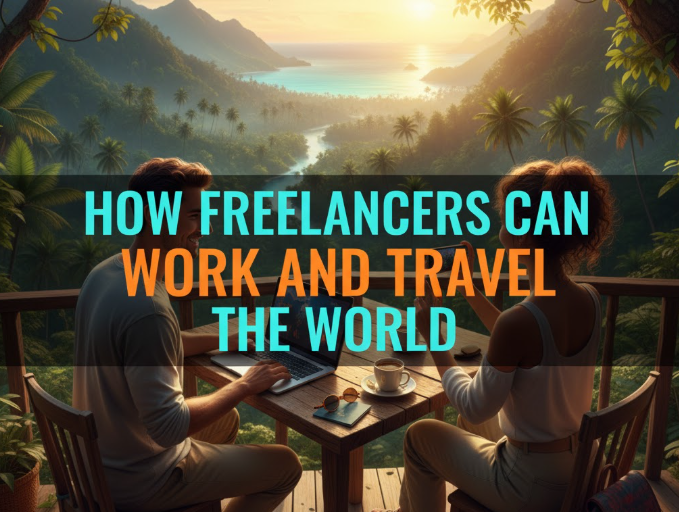Work And Travel The World: How Freelancers Can Do It
Picture yourself waking up to the sound of waves hitting a beach in Bali, popping open your laptop at a cafe in Paris or attending client calls while watching the sunset over Santorini. It’s not just a dream for freelancers: It’s how thousands of people are living already. The idea to work from any place has redefined the way you look at our careers and freelancing gets that ideal pass to journey throughout the world with a job.
The digital age has transformed it into a comfy time to fill up a suitcase and pick up a laptop all while becoming the formidable road warrior. The world is your office, as they say. But working on the road is not all about booking cheap flights and tracking down free Wi-Fi. Making it work requires planning, discipline and smart strategies. In this guide, you are about to learn how to transform your freelance business into a passport to adventure.
Why Freelancing Is Ideal For Travel
Freelancing and travel are a match made in heaven, or rather like coffee and mornings. Unlike regular 9-to-5 jobs that get you shackled to a desk all day, freelancing allows you to choose when, where and how you work. You call the shots on your schedule too, so designing a workday around adventures beats squeezing it in.
The best part? You don’t have to wait for your two weeks of vacation time or ask permission to travel someplace new. Through freelancing, work and exploration can merge each day. Complete your projects in the morning, then spend afternoons hiking mountains, sampling new foods or immersing yourself in other cultures.
You know what many freelancers realize when they travel? That it actually helps them be more creative and productive. New surroundings bring forth new thoughts, exposure to people of a different background expands your horizons and simply being in a new city can serve as motivation. Plus, the cost of living in a lot of countries is lower than it is in many Western nations — so your dollar goes further.
Preparing Your Freelance Business for the Road
Before you go ahead and book that one-way ticket somewhere, though, you need to ensure your freelance business is set up to deal with it. That means creating systems that function regardless of where you are.
Building A Strong Client Base
The key to successful travel freelancing is having a reliable base of clients who keep consistent work for you. You’ll have no freedom to travel if you’re constantly fretting about where your next paycheck will come from. Try to get 3-5 consistent clients before you start traveling, or save enough money to support yourself for 3-6 months.
Instead, focus on finding clients who care that the work gets done, not where you’re sitting when it does. Remote-friendly clients are used to working with freelancers all over the globe and may not care if you’re sending them emails from a different time zone. You can also cut off questions about your travel plans by being upfront, but also letting the person know it won’t impact your work quality or time.
Creating Portable Income Streams
The savviest traveling freelancers don’t have all their eggs in one basket. They create many streams so that if one dries up, they are not left high and dry. Here are some options:
Active freelancing: Exchanging hours for dollars working with clients
Passive income: Making digital courses, templates or products you can sell in your sleep
Retainer clients: Monthly contracts for steady income
Affiliate marketing: Earning it by recommending products or services
Teaching or consulting: Offer your expertise via online sessions
Having multiple income streams can provide more security and flexibility. If you decide to have a week-long adventure in a new city, your passive income still rolls in behind the scenes.
Be Ready with the Right Tools and Systems
To work from anywhere, you need the right digital toolbox. Here’s what you absolutely need:
Communication Tools: Zoom, Skype or Google Meet for video calls with clients. Slack or WhatsApp for fast messages. A professional email signature that originates from your phone and computer.
Project Management: Tools such as Trello, Asana or Monday.com to help keep track of deadlines and structure your work. Time tracking app such as Toggl demonstrate to clients how long projects take.
Banking: PayPal, Wise (formerly TransferWise), or Payoneer as the receiver for payments from outside your local country. Accounting software such as Wave or QuickBooks to monitor income and expenses for tax purposes.
Cloud Storage: Google Drive, Dropbox or OneDrive allow you to have access to all of your files from any device. Always keep a backup of your work — losing a laptop in a foreign country is stressful enough without losing all files with it.
VPN Service: A Virtual Private Network protects your privacy while you’re on public Wi-Fi and allows you to access sites that may be blocked in some countries.

Choosing Your Destinations Wisely
Some locations are better to work in than others for travelers. Some cities are freelancer paradises, with fast internet and low costs of living and emerging communities of other remote workers. Others might look beautiful on Instagram, but make it nearly impossible to get work done.
Top Factors To Consider
Internet Speed And Reliability: This point is a deal breaker. You cannot meet deadlines, or attend video calls with a lagging internet. Investigate what average speeds are in your destination, and read reviews from other digital nomads on connectivity.
Cost Of Living: Your money will go further abroad. Find locations where your rent, food and entertainment will cost less than at home. The quality for price in Southeast Asia, Eastern Europe and much of Latin America is excellent.
Time Zones: Consider the location of your clients. If the bulk of your clients are in New York and you’re based in Tokyo, then you could be pulling all-nighters. A few hours of time lag is manageable, but when it’s a huge gap, life becomes tough.
Visa Requirements: Some countries will allow you to stay for 30-90 days without a visa. Others require advance applications. Some countries have begun to offer special digital nomad visas, which allow you to stay and work there legally for a year or longer.
Safety And Infrastructure: Pick countries where you can walk around with a laptop without worrying, and where the infrastructure is such that you have easy access to accommodation, coworking and good services (like fast internet).
Popular Destinations For Digital Nomads
| Destination | Cost Level | Internet Quality | Best For |
|---|---|---|---|
| Bali, Indonesia | Low | Good | Beach lovers, yoga enthusiasts |
| Chiang Mai, Thailand | Very Low | Excellent | Shoestring travelers, culture fiends |
| Lisbon, Portugal | Moderate | Excellent | Base in Europe, mild climate |
| Medellín, Colombia | Low | Good | Spanish speakers; views of the mountains |
| Budapest, Hungary | Low-Moderate | Excellent | Historical charm; thermal baths |
| Mexico City | Low-Moderate | Good | Foodies; art hounds; minimal time difference |
| Da Nang | Very low | Good | Beach and city life |
| Tbilisi | Very low | Good | Off-the-beaten path wine country |
Each has its own vibe and benefits. Some roam between multiple cities year-round while others discover a single base they adore and stay awhile, even months.
Balancing Work on the Go
The work-life travel balance. Tempting as it is to let the lines between work and relaxation blur, for travelers forced into remote work by a pandemic, finding that sweet spot can be extra fraught. You don’t go half around the world to just sit and look at your computer all day, but you also can’t ignore the things that bring you to that place.
Creating A Routine That Works
You may be free from the 9-5 grind, but you do need some sort of structure. Without it, days blur and deadlines startle. The trick is to develop a flexible routine that provides you consistency without feeling overly restrictive.
There is also the work first, play later mindset that many traveling freelancers have. They get the most important work done in the morning, when they are fresh, then reward themselves by having adventures in the afternoon. Some like to divide their days: working in the morning, exploring midday, working again in the evening.
Determine when you are at your most productive, and defend that time. If you are sharpest in the morning, do not book a sunrise hike the day before a major deadline. If you work best late (runs until midnight on weeknights), leave it be and sightsee in the early parts of the day if you are a late-to-bedder.
Dealing With Time Zone Challenges
Working across time zones can be challenging but not impossible. The secret is simple: communication and timing, smart scheduling. Tell clients your working hours in their time zone so they have an idea when to expect a response. Leverage apps such as WorldTime Buddy to graphically understand time zone variances and prevent the scheduling nightmares.
For meetings, look for times that are somewhat good for everyone. If it’s a case of, you’re in Asia and your client is in California, when it’s early evening for you, it’ll be early morning for them — not ideal for either of you but better than nothing. Record significant meetings so that you can play back what was discussed if you joined while half-asleep.
Some freelancers intentionally select locations that mitigate time zone disparities with their primary clients. Life is easier if most of your work comes from Europe to remain in European time zones, or even similar ones.
Setting Boundaries And Staying Focused
It is a café with an amazing view or a beach-side bungalow can do that. You also require some methods to help you concentrate:
Designate Work Spaces: The temptation will be there to work from bed or wherever, but try not to constantly shift spots. Come up with two or three reliable spots — a coworking space, a quiet café, your accommodation’s common area — and treat those as your offices.
Try The Pomodoro Technique: Work for 25 minutes, and rest for five. After four rounds, rest for 15-30 minutes. This is how you’re able to be productive without becoming burned out.
Silence those Notifications: All notifications can be done away with during work hours, except for essential work communications. Social media and travel apps, messaging can wait.
Advertise Availability: Tell your travel companions when you are working. If you’re on holiday with friends who are not working, they must remember that you can’t make spontaneous plans at the drop of a hat during work hours.
Money Matters: Budgeting And Finances
It is more challenging to manage money while on the road than when you’re stationary. You’re working in multiple currencies, with income that ebbs and flows and expenses that can vary widely by destination.
Creating A Travel Budget
The first step is determining your baseline monthly expenses — exposing the pure minimum of what you need to survive. Add housing, food, internet connection, insurance and any client subscriptions or tools. Then tack on a buffer for the fun stuff — dinners out, excursions, souvenirs and unforeseen expenses.
Here is an example of a regular monthly budget for itinerant freelancers:
| Expense Category | Budget Range |
|---|---|
| Accommodation | $300 – $800 |
| Food and Groceries | $200 – $500 |
| Transportation | $50 – $200 |
| Coworking Space | $0 – $200 |
| Travel Insurance | $50 – $100 |
| Entertainment | $100 – $300 |
| Miscellaneous | $100 – $200 |
| TOTAL / month | $800 – $2,300 |
Your actual costs will vary wildly depending on where you live and style. Expensive cities cost more to live it up in. Staying in cheaper countries and cooking your own meals puts the tab lower still.
Staying Ahead of Taxes: Working as a Freelancing Traveler
When your life is always on the go, taxes can get complicated. That’s because for the most part, you are still required to pay taxes in your home country even if you live elsewhere. Some countries have treaties that prevent double taxation, but how the rules work differ widely.
Speak with an accountant who specializes in expat or digital nomad taxes. They can help you:
- Know your tax responsibilities at home
- Track deductible business expenses
- Make quarterly tax payments if necessary
- Steer foreign earned income exclusions, if relevant
Keep detailed records of all your income and expenses. Have your accounting software automatically sort everything. You’ll thank yourself when tax season rolls around.
Saving Money While Traveling
Traveling doesn’t need to cost you a fortune. Resourceful freelancers figure out ways to save money without losing experience:
Slow Travel: The destination is not the point: Staying for weeks or months in one spot rather than city-hopping every few days saves on transportation and accommodation costs, because you can bargain down the rate.
Cook Your Food: Dining out is an exciting part of the experience, but cooking the majority of your meals slashes food costs.
Take Local Transportation: No to taxis and rental cars. Walk, bike or take local buses and trains as residents do.
Discover: Every place has free or low-cost ways to enjoy yourself — hiking, beaches, museums that offer free days, local festivals and exploring neighborhoods on foot.
Negotiate Long-Term Rates: Request special rates for monthly accommodations. A lot of hosts give a discount of 20-30% for extended reservations.
Creating A Support Network While On The Road
Freelancing and traveling alone can get lonely. We’re social animals, we humans, and we require connection even when we’re living the dream. Creating a network of friends, colleagues and other travelers helps sustain the lifestyle in the long run.
Finding Your Tribe
Coworking spaces are treasure troves for meeting other freelancers and digital nomads. The spaces include networking events and skill-sharing workshops, as well as social meetups. Even if you don’t need a desk there, it can be worth buying a day pass to go and attend some of the events in order to network.
Online communities will help you make connections before you even get to a new place. Facebook groups for digital nomads in certain cities allow you to ask questions, search for roommates and organize meet-ups. Sites like the Nomad List have forums on which travelers share advice and ask questions.
Go to local meetups, language exchange or hobby-related groups for something that interests you. You will encounter both travelers and locals, thus offering you a more colorful experience of the place you are visiting.
Dealing With Loneliness And Burnout
Even with friends nearby, traveling freelancers can still feel lonely. You never get to say hello, leave alone shake someone’s hand without having already said goodbye and passed on. You’re missing family and old friends from back home. The novelty of new spaces can wear thin, overtaken by fatigue.
Combat loneliness by:
- Setting up regular video chats with loved ones from home
- Spending enough time in any one place to make genuine friends
- Taking part in group activities, rather than always venturing alone
- Admitting when everything is not OK and you really care how others feel
- Stopping when you need to
Burnout occurs when, in your inflated sense of duty/fear you’ll miss out on something, you take napping off the table and do all the things — working full-time while checking every tourist attraction box and attending every social invite. Allow yourself to have boring days, where you only work, rest and recharge. Not every day has to be an adventure.
Staying Healthy And Safe Abroad
Your health and safety are more important than any due date or final location. Self-care on the road takes some patience and mindfulness.
Getting The Right Insurance
Freelancers who travel don’t have a choice but to be insured when traveling. Standard travel insurance provides coverage for short-term trips, but you’ll need something tailored to long-term travel or nomadic lifestyles. Look for policies that include:
- Medical emergencies and hospital stays
- Medevac if you have to be flown elsewhere for treatment
- Laptop and equipment theft or destruction
- Trip cancellation or interruption
- Coverage that doesn’t stop or change with you when you travel to other countries
You can buy plans created for digital nomads from companies such as SafetyWing, World Nomads and IMG Global. They are not expensive — often about $40-80 per month, depending on where you live — and well worth it if something happens.
Maintaining Physical And Mental Health
Traveling wreaks havoc on routines, and can cause health consequences. You might eat differently, exercise less or lose sleep to see more. Combat this by:
Mini Routines: Even when your world shifts, maintain some routines. Morning stretches, evening walks or twice-weekly exercise classes also bring you stability.
Making Sleep a Priority: Jet lag, loud hotel rooms and excitement of being somewhere new can all sabotage sleep. Purchase earplugs, an eye mask and white noise apps. Protect your sleep schedule.
Keep Moving: Walk instead of hailing cabs. Discover yoga classes, gyms or a running group. Many hostels and coworking spaces also offer fitness facilities.
Eating Well: Eat local food, but keep in mind your nutrients. Balance street food exploration with home cooking that includes some vegetables and protein.
Managing Stress: Meditation apps, journaling or just sitting quietly for some time can help you deal with the stress of constantly adjusting to new environments.
Keeping Your Belongings Secure
When you lug around valuable stuff, people will try to steal it from you. Protect your gear and documents:
- Use theft-proof backpacks which come with hidden pockets and slash-resistant material
- Never leave your laptop in the car on display or unattended outside
- Digital copies and photos. Make sure to have both physical and digital versions of all your key documents. This includes a copy of your passport, visa for the country you’re visiting and any important insurance purchases you’ve made
- Lock your bags and your lockers in any hostel
- Think about getting valuables confirmed by customs of your own country before you fly – could be useful when returning home
Making It Sustainable Long-Term
For those first few months, traveling and working feels like magic. Everything is new and exciting. But in order for this way of life to be sustainable in the long term, you really have to consider sustainability (financially as well as emotionally and professionally).
Growing Your Business While Traveling
Don’t allow your business to stagnate while you’re on the road. Continue to level up, increasing your rates and looking for new opportunities. Enroll in online classes when business is slow. Sign up for online conferences in your field. Bring your portfolio to life with stunning projects.
You can charge a higher rate as you get more experienced, leaving you free to work fewer hours for the same money. This will leave you with more time to enjoy your travel, and less worry about your money.
Knowing When To Pause Or Stop
Not everyone desires to travel indefinitely, and that’s perfectly fine. Also, some freelancers spend a few years around the world and then decide to settle down. Still others travel part time, going back and forth between home bases and adventures. There’s no right answer.
Listen to what this feeling has to say. You’re at a healthy place. You are in a good place if you look forward to getting up and starting your day. When you’re perpetually tired, worried about money or dreading work, something has to give. Perhaps you just need a travel break. Perhaps you need to lighten your load. Perhaps you should consider trying to find a home base for a while.
The good thing about freelancing is that you can always change your mind. You can travel for six months, come home for six months, go out again. You make the rules.

Frequently Asked Questions
How much money do I need to start a traveling life as a freelancer?
Most experts suggest having at least $5,000-10,000 saved up before you begin. This is to cover your up-front travel costs, deposits on places to stay, and give you a cushion until you begin rolling with the work. You will also need sufficient ordinary income to pay your regular living expenses along with making investment contributions.
Do I need special visas to work remotely in other countries?
Tourist visas rarely allow for work, but many countries turn a blind eye to remote workers who aren’t elbowing locals out of job opportunities. Even more countries now have digital nomad visas designed explicitly for remote workers. Check the requirements for each destination before you go.
What if my laptop breaks when I am on the road?
This is why insurance and cloud backups (as untrusted as those might be from a privacy perspective) are important. In big cities, you’re likely to find Apple stores or computer repair stores. A small percentage of travelers tote a backup tablet or simple laptop. Supplement your files to a daily cloud storage, in case you lose important things.
Can I travel around with a family as a freelancer?
Absolutely! Lots of families travel as parents work from home. It’s more work — you have to find family-friendly lodging, consider your children’s education and figure out child care while you’re working — but thousands of families pull it off and make it a success.
What’s the etiquette for client meetings when I’m in a time zone far, far away?
Be honest with your clients about where you are and when your working hours are. Use scheduling tools that display time zones distinctly. Record the meetings you can’t attend live. If the quality of your work is good and you communicate well, many clients are flexible.
What are the best jobs for freelancers who like to travel?
Freelance writing, graphic design, web development, digital marketing, virtual assistance and consulting make good travel gigs; online teaching and social media management do too. Any work that has only a laptop and internet connection, works!
How can I be productive in new and exciting places?
Establish a schedule, separate work areas, practice time-blocking and set boundaries. Keep reminding yourself that you’re not away on a two-week holiday and therefore do not need to see everything in the first week. Take it easy and find a balance between work and adventure.
Is traveling and working by yourself lonely?
It can be, but it need not be. Use social accommodation like hostels and co-living spaces, work from coworking spaces, check out meetups and events, and join digital nomad online communities. Social life is a muscle that can be built, and requires input, but entirely achievable.
Your Journey Starts Now
Being able to work and travel the world as a freelancer is one of the most rewarding ways you can design your life, so don’t waste it! It can be part professional growth, part personal adventure — an opportunity to earn a living while navigating various cultures, landscapes and perspectives.
The path isn’t always easy. And there will be challenges, such as unreliable Wi-Fi, difficult clients, homesickness and doubts about what you’re doing. But you’ll also get more rewarding highs — finishing a project while the sun sets over ancient temples, making lifelong friends from different countries, realizing strengths you never knew existed.
Start small if you need to. Spend a month in your neighboring country to feel things out. Grow your freelance business in place, and expand when the time is right. Or jump and figure it out as you fall. There is no ideal time or method for this.
The world is large, with billions of people in it, among them rich activists and poor ones. Anywhere you will go, with your skills and laptop. Just do something, anything that moves you closer to those dreams you keep in the back of your head: Buy the ticket; pack the bag and assume you’ll figure the rest out when it comes. Your adventure is waiting.




